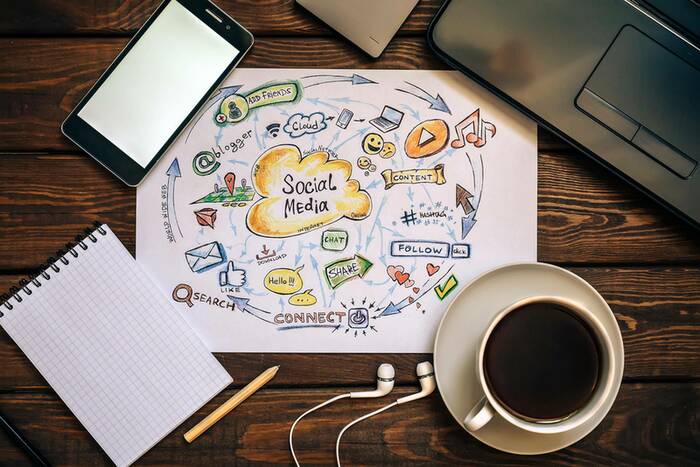
We are a part of a social media induced culture. It has revolutionised the way we communicate, talk business, and interact with the world around us. It has become such a constant in our everyday routine that we are blissfully unaware of the ways it can impact us, both positively and negatively.
A survey revealed that 47% of millennials spend up to four hours a day on social media platforms, and that 38% of them purchase something that they see whilst scrolling. This highlights a clear correlation between social media and consumer culture. That’s not all - this also suggests that social media can play a more serious role in one’s financial life than we may have previously anticipated. So, let’s dig a little deeper – How does social media make you spend more money and what can you do to avoid falling victim to its shrewd marketing practises?
1. Time Is Money
I’m sure that you are all familiar with the famous saying “time is money”, and with the daily social media usage of global internet users amounting to 135 minutes per day, it couldn’t be more relevant.
The more time spent on social media can also develop into an addiction. An addiction means that you are spending more time on social media, and more time being exposed to astute marketing tactics and adverts. As a result, you will probably feel added pressure to imitate what you see online and spend more money as a consequence.
At first glance, you may feel that spending a couple of hours on social media per day is completely harmless. However, on closer inspection, the amount of time spent here may cause other things to happen that ultimately impact productivity levels and cause you to lose money. For example, social media has been linked to sleep deprivation and new research warns that as little as 1 hour of social media use per day can entirely disrupt your sleeping pattern. This means that you are likely to be less productive at work and will feel less inclined to spend more time on other tasks that would be beneficial to your financial life.
It is important to be aware of how much time you are spending on social media and equally as crucial that you assess your reasons for doing so. Try and limit your usage to 30 minutes a day and prioritise work, socialising, and other activities before you consider picking up your phone.
Interesting Fact: The Independent detailed a story on a woman who racked up $10,000 in debt after moving to New York in an attempt to become a social media star. Lissette Calveiro expressed that whilst her instagram personality exuded glamour, luxury, and beauty, her reality was far from it. Due to her need to spend money on expensive outfits, meals, and holidays to keep up with her online persona, she ended up with several regrets and racks of debt.

2. Stress And Self-Esteem
Research from the Happiness Research Institute in Copenhagen revealed a correlation between stress and social media. They found that people who were forced to quit Facebook for a week as part of a study felt 55% less stressed than those who kept using it.
A lot of people use social media as a form of escapism, a means to de-stress, and a distraction from things going on in the real world. But by escaping reality, you are not confronting any of your real-world issues, which can actually cause various strains on physical and mental health including stress, anxiety, and depression.
We are taught the following:
Low self-esteem? Hop on Instagram, get completely bought into the latest weight loss product endorsed by your favourite influencer. That’ll definitely make me feel better about myself!
Stressed out? Remember that Jacket that popped up on your Facebook feed yesterday? Retail therapy will do the trick!
These are only a few outcomes that may be fuelled by intrusive thoughts. Social media has taken up a lot of our free time and our extended exposure to social media influences has proven links to one’s increased stress levels and knocked self-esteem.
Why?
The flaunting of perfect, filtered, online lives can cause us to feel unaccomplished, inadequate and unsuccessful. And frankly, Stress and low self-esteem can be a recipe for disaster. You are not only more likely to indulge in retail therapy, but you may find that you spend money on things that you think will boost your self-esteem and validate you.
Disconnecting from the online world is a great way to sidestep this. We must learn that relying on happiness and satisfaction from things that are completely out of our control is self-sabotaging and not in the best interests of our mental, physical, or financial health.
3. FOMO & Unrealistic Expectations
With a lot of people trying to replicate what they see on social media, we can sometimes find it difficult to combat our inclination to keep up appearances, particularly for Millennials. This thinking has become so engrained in society that several Millennial money myths have been born out of it. Something as innocent as tweeting a picture of yourself sipping on a coconut in the Caribbean can become a catalyst for feelings such as ‘FOMO’ (fear of missing out) and jealousy in other people.
Equally, these types of posts have been argued as contributing to the normalisation of luxurious and lavish lifestyles incessantly bombarded by social media. In an attempt to prove the significance of social media in travel inspiration, Expedia carried out a survey on those aged 18-34 to find out what inspires young people to travel. They found that it wasn’t just cheap alcohol and wanderlust that prompted their choice of travel destination but 2/3rds of the cohort prioritised the ‘instagrammability’ of the location.
Whilst social media has changed our travel habits, it is not the only thing that has been impacted. It has also affected the way we perceive our bodies, our health habits, our hobbies, and even the clothes we wear. In an attempt to ‘keep up’ and feel validated, we often find ourselves in situations where we consider purchasing things that are way out of our budget. Sometimes you need to take a break and think to yourself: “Would I be buying that holiday or getting that ridiculously priced acne treatment that went viral if it were not for celebrity endorsements and social media influences?”
Interesting Fact: In the journal of consumer research, a study revealed that those who spend more time on social media have less restraint and so are more likely to impulse buy than individuals who spend less time on social media platforms.
4. Ad-targeting Campaigns
With modern technology constantly evolving, we have so much to be grateful for. Everyday tasks have been made much easier and our quality of life has significantly improved. With that said, technology has also given way to crafty marketing tactics and has impacted the way consumers interact with the online world.
Businesses from all over the world use traditional advertising to target potential customers. But how much goes on digital advertising? With the demand for digital marketing growing, it is no surprise that 60% of marketers across various industries have decide to opt for digital marketing over more traditional approaches. What’s more, it was revealed that 25% of all UK digital advertising spend was spent on social media. It is forecasted that UK marketeers will spend a huge £3.3 billion on social media advertising in the year, which is a 24% increase from 2017.
But, why the increase?
One word, four syllables – ad-targeting. Social media sites such as Facebook are now capable of targeting potential customers in ways that even surprised me. Since establishing partnerships with data brokers such as Epsilon, Acxiom, and Datalogix, Facebook has access to trillions of data transactions and therefore, they can access really useful data information that can be used to target potential customers.
With this information, Facebook can know things like if you’re getting married, if you like designer watches, if you prefer to play Tap Tap Dash over Candy Crush, and if you’ve got a thing for real life documentaries!
Due to the specific nature of the information Facebook can pull, businesses are able to really drill down on their target demographic and get really specific in who they want to target. By doing this, they are likely to convert more consumers into customers purely because the ad is going to be more accurate in targeting their primary demographic.
Whilst this may be great for them, it can be worrying for consumers. This means that we may be swayed to spend more and more frequently. However, if want to opt out of this then you can do this via google by simply ‘opting out of personalised ads’ in your ads settings. You can also do this on Facebook by clicking on ‘settings’, ‘ads’, ‘ads based on my use of websites and apps’ and choosing to turn it off.
Conclusion
Social media is tricky. Regardless of how smart one might be, it is everywhere, and it can covertly influence our financial habits without us even knowing. So, it is important to stay conscious of your financial goals and be aware of how these marketing ploys can impact you so that you are one step ahead. It’s easy to get caught up in it all though - so maybe go off the grid for a while? Take a minute to unplug from the online world, prioritise your mental, physical, and financial health, and just enjoy the here and the now.